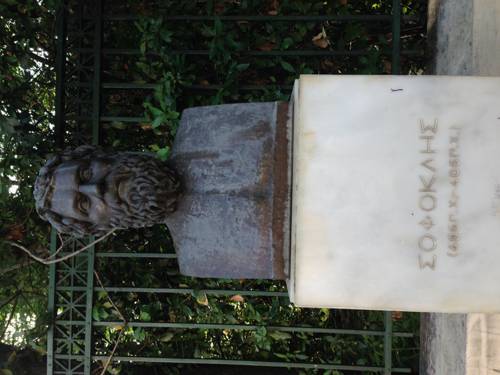
FAQ About Sophocles

Who was Sophocles?
Sophocles was an ancient Greek playwright, best known for his tragedies. Born around 497/6 BC in Colonus, a village near Athens, he was one of the most important writers of ancient Greek drama, along with Aeschylus and Euripides. Sophocles is particularly celebrated for his contributions to the development of dramatic structure, especially through complex character development and the integration of third actors in performances.

What are some of Sophocles’ most famous works?
Sophocles is best known for his Theban Plays: Oedipus Rex, Oedipus at Colonus, and Antigone. These tragedies explore themes of fate, personal choice, and divine retribution, and remain central works in the study of classical literature and drama.

How did Sophocles influence Western literature?
Sophocles had a profound impact on Western literature by refining the structure of drama. He introduced the use of the third actor and focused on detailed character development and emotional depth, which helped shape theatrical traditions. His use of dramatic irony became a staple in narratives, influencing countless writers and playwrights throughout the ages.

What was unique about Sophocles' style of writing?
Sophocles was known for his ability to create complex characters and plots. Unlike his predecessors, he placed a strong emphasis on individual characters and their psychological development. This led to more intricate and emotionally engaging narratives. His use of dramatic irony was also groundbreaking, allowing audiences to perceive a deeper meaning and foreshadowing within the story.

When did Sophocles live and compose his plays?
Sophocles lived from approximately 497/6 BC to 406/5 BC. His career spanned much of the 5th century BC, during which he composed over 120 plays. However, only seven complete works have survived to this day, along with fragments of others.

What themes are prevalent in Sophocles’ plays?
Sophocles’ plays often deal with complex themes such as fate versus free will, the role of the gods, moral and ethical dilemmas, and the consequences of human actions. His characters frequently face tragic situations that explore the limits of human knowledge and the power of destiny.

How many of Sophocles’ plays have survived?
Out of over 120 plays that Sophocles is believed to have written, only seven have survived in their entirety: Antigone, Oedipus Rex, Oedipus at Colonus, Electra, Ajax, The Trachiniae, and Philoctetes. These works continue to be studied and performed today.

What innovations did Sophocles bring to Greek theater?
Sophocles introduced significant innovations in Greek theater, including the addition of a third actor, which allowed for more complex interactions between characters. He also reduced the importance of the chorus, focusing more on individual character development and intricate plot structures. These changes helped set the stage for modern dramatic techniques.

How does Sophocles’ play 'Oedipus Rex' illustrate the theme of fate versus free will?
Oedipus Rex is a quintessential illustration of the theme of fate versus free will. The narrative revolves around Oedipus, who is destined to kill his father and marry his mother, despite his efforts to escape this fate. The play explores the limits of free will and questions whether human beings can escape their predetermined destinies.

What impact did Sophocles have on his contemporaries and successors?
Sophocles' work greatly influenced his contemporaries, such as Euripides, and later generations of playwrights. His innovations in tragedy, including complex character development and use of dramatic irony, became foundational to the genre and inspired playwrights for centuries, from ancient Rome to the Renaissance, and even in modern drama.

In what way did Sophocles differ from his contemporary playwrights, Aeschylus and Euripides?
Sophocles differed from his contemporary playwrights by focusing more on character development and psychological depth rather than grand themes or innovative story structures. While Aeschylus was known for expanding the number of actors and developing dramatic structure, and Euripides for his exploration of controversial social themes and complex female characters, Sophocles was celebrated for creating relatable and human characters who faced moral and ethical issues.

What is the significance of the chorus in Sophocles' plays?
In Sophocles' works, the chorus often serves as a moral and emotional commentator on the events of the play. While the importance of the chorus decreased compared to earlier Greek drama, it still plays a crucial role in providing context, background information, and reflections on the themes and actions occurring within the narrative. The chorus bridges the audience and the dramatic action, enhancing the overall impact of the play.

How did the political climate of Athens influence Sophocles’ plays?
The political climate of Athens during Sophocles' lifetime, which included the rise and fall of the Athenian Empire and the Peloponnesian War, deeply influenced his works. His plays often reflect the complexities and moral ambiguities of political power and its effects on society. They explore themes of justice, leadership, and the relationship between the individual and the state, mirroring the societal and political issues of his time.

Was Sophocles involved in other aspects of Athenian society besides theater?
Yes, Sophocles was actively involved in Athenian society beyond his work in theater. He served as a priest and also held various public offices. Notably, he was appointed as a general during the Samian War alongside Pericles. His involvement in politics and religion may have influenced the themes and characterizations in his plays.

What role does irony play in Sophocles’ works?
Dramatic irony is a hallmark of Sophocles' works, particularly evident in plays like Oedipus Rex. Here, the audience is aware of critical information that the protagonist, Oedipus, is not, creating a tension that enhances the tragic dimension of the play. This use of irony not only deepens the narrative but also engages the audience, encouraging them to reflect on larger themes of fate, knowledge, and ignorance.

How have Sophocles' plays been preserved throughout history?
Sophocles' plays have been preserved through a long tradition of copying and recopying manuscripts by hand during the medieval period. His work survived due to its enduring influence and popularity. The rediscovery of ancient texts during the Renaissance, together with the advent of the printing press, played crucial roles in preserving these works for modern audiences.

How does 'Antigone' reflect the conflict between personal morality and state laws?
Antigone presents a dramatic conflict between personal morality and the laws of the state. The protagonist, Antigone, chooses to defy King Creon's edict to not bury her brother Polynices, whom she believes deserves a proper burial according to divine laws. This act of defiance raises questions about the nature of justice and the prioritization of personal conscience over civil obedience, offering a profound exploration of individual versus state rights.

Why is Sophocles considered a pillar of ancient Greek theatre?
Sophocles is considered a pillar of ancient Greek theatre due to his innovations in dramatic structure, character development, and thematic complexity. By introducing the third actor and focusing more on dialogue and character interaction, he significantly transformed the theatrical tradition. His enduring influence is evident in how fundamental his plays remain to the study and performance of theatre today.

What were the major festivals during which Sophocles' plays were performed?
Sophocles' plays were often performed during major Athenian festivals such as the Dionysia and the Lenaia. These festivals celebrated the god Dionysus and were central to cultural and religious life in Athens. They included competitions for playwrights, where dramatists like Sophocles would present their latest works. These gatherings were crucial in promoting dramatic arts and fostering a competitive spirit among playwrights.

How has Sophocles been portrayed or referenced in modern media and literature?
Sophocles has been referenced and portrayed in various forms of modern media and literature, illustrating his lasting impact. His plays have been adapted into films, operas, and modern theatrical performances. Additionally, themes from his works continue to resonate in contemporary literature, exploring human nature, morality, and the complexities of fate—further highlighting his timeless relevance.
